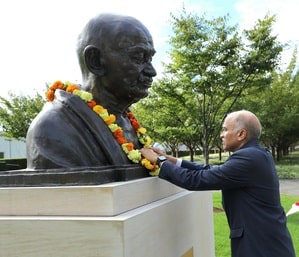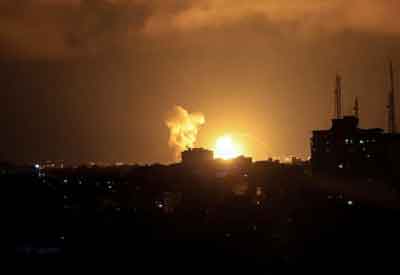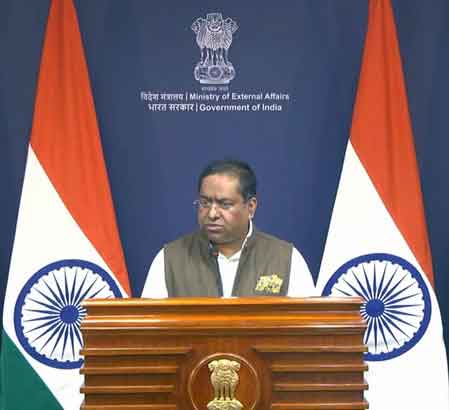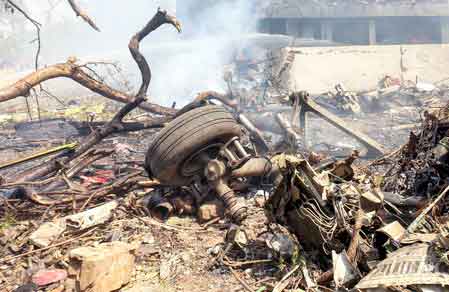Overwhelmed by intractable conflicts, the world organisation observed Mahatma Gandhi’s birth anniversary as the International Day of Nonviolence, looking for glimmers of hope in the leader’s vision.
Secretary-General Antonio Guterres said that “from Ukraine to Sudan, the Middle East, and far beyond, war is creating a hellscape of destruction, destitution, and fear.”
Against this is the power of non-violence, he said.
“Gandhi believed non-violence was the greatest force available to humanity – more powerful than any weapon,” Secretary-General Antonio Guterres said in a message.“Together, let's build institutions to support that noble vision.”
General Assembly President Philomen Yang said: “As the world endures a turbulent period, with conflicts raging in Gaza, Lebanon, Myanmar, Sudan, Ukraine, and elsewhere, the Mahatma’s message of peace resonates more strongly than ever.”
Gandhi's idea of satyagraha influenced Nelson Mandela in South Africa and Martin Luther King Jr in the US. They were deeply influenced by Gandhi’s concept of Satyagraha “which teaches that truth and justice are not achieved through violence but through moral courage and peaceful dialogue,” Yang said in the message delivered by his chef de cabinet Ivor Fung at a meeting on Gandhian Values and UN Charter.
India’s Permanent Representative P. Harish said: “The story of India reflects Mahatma Gandhi's belief that strength comes from righteousness, not force, that power comes from truth not might, and that victory comes from moral courage, not imposed submission.”
“Today's commemoration helps us in reflecting on the life of Gandhiji and reaffirming the universal relevance of the principle of non-violence,” he said.
Sri Lanka’s Permanent Representative Mohan Pieris found parallels between Gandhi’s principles and the UN Charter, aligning them with its Articles.
Article 1 of the UN Charter on the importance of maintaining international peace and security through peaceful means mirrors Gandhi's advocacy for non-violent resolution of conflicts, the concept of Satyagraha, he said.
Gandhi's concept of Sarvodaya, the upliftment of all, is reflected in the Preamble and in Article 55 that emphasise economic and social development, for all nations, reflecting on the ideas of inclusivity and universal welfare.
Jamaica’s Permanent Representative Brian Christopher Manley Wallace said that Gandhi’s “commitment to the protection of the inherent dignity and equality of all human beings, championing the rights of the marginalised and oppressed, and emphasising that every individual deserves freedom and respect” are “the foundation of the Human Rights pillar of the United Nations, and are reflected in the Universal Declaration of Human Rights.”
Vietnam’s Permanent Representative Hoang Giang Dang said that Gandhi’s principle of the right to self-determination for all peoples and his ideas of truth and freedom inspired the anti-colonial movement in many countries in Asia and Africa, “including the freedom struggle in Vietnam led by our great founding father, President Ho Chi Minh.
“While India and Vietnam took different paths to freedom, both the Mahatma and President Ho Chi Minh shared a strong sense of national independence and the common struggle for liberation,” he said referring to his country's revolutionary wars against France and the US.
Vatican’s Permanent Observer Gabriele Caccia contrasted the heated Security Council session on the Middle East in the morning “where it seemed that only force can solve the problems and the one who has more force can make it right” with the meeting on Gandhian principles and ideas.
“There are words on papers, beautiful words in the [UN] Charter, but what makes the difference is the personal engagement,” he said.
“What made Mahatma Gandhi Mahatma is not what he said, but what he did according to what he thought, the consistency of his life.”
Earlier in the morning, Harish garlanded the statue of Gandhi in the UN headquarters campus.
The UN General Assembly declared Gandhi’s birth anniversary as the International Day of Non-Violence to “disseminate the message of non-violence, including through education and public awareness.”






Drugs worth Rs 4 crore seized in Tripura, one held
Tripura Police on Sunday seized drugs worth Rs 4 crore and arrested a drug peddler, who ferried the narcotics to the state from Mizoram via southern Assam, an official said.
BJP ally Tipra Motha Party seeks PM Modi's intervention to deport Tripura's illegal immigrants
The Tipra Motha Party (TMP), a tribal based party and an ally of the ruling BJP, demanded Prime Minister Narendra Modi's intervention to identify and push back all illegal Bangladeshi immigrants living in Tripura to the neighbouring country.
Tripura BJP holds candlelight rally against vandalism at Tagore's ancestral home in B'desh
The ruling BJP in Tripura on Sunday held a candlelight rally to protest the recent attack and vandalism of the ancestral home of Nobel laureate Rabindranath Tagore in Bangladesh.
Minister Ratan Lal Nath shares fruits from his orchard with villagers
In a heartwarming gesture that has become a cherished annual tradition, Agriculture and Farmers’ Welfare Minister Ratan Lal Nath on Sunday once again distributed fruits from his personal orchard among the people of his native village, Koroitala in Mohanpur under West District.
IMD issues orange alerts for very heavy rainfall over Tripura
The Meteorological Centre, Agartala has forecasted heavy to very heavy rainfall accompanied by thunderstorms, lightning, and gusty winds over Tripura from 16th to 18th June 2025.
Tripura Police seize Yaba tablets worth Rs 4 Crore, one arrested
In a major operation against drug trafficking, Tripura Police on Sunday seized 80,000 Yaba tablets valued at around Rs 4 crore from a truck at the Churaibari check post in North Tripura district, near the Assam border.
PCC to launch outreach campaign from June 22, highlighting BJP’s failures
In line with the directives of the All India Congress Committee (AICC), the Tripura Pradesh Congress Committee (TPCC) on Sunday announced a state-wide public outreach campaign starting from June 22.
Two drowned in Pune bridge collapse, PM Modi speaks to CM Fadnavis
At least two people were killed, 32 others injured, while a total of 41 people were rescued after they fell into an overflowing river when an old bridge they were crossing collapsed in Maharashtra's Pune district on Sunday.